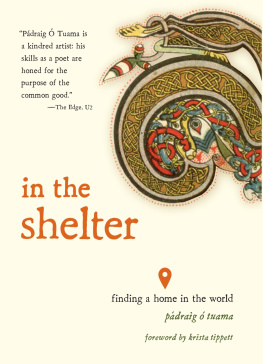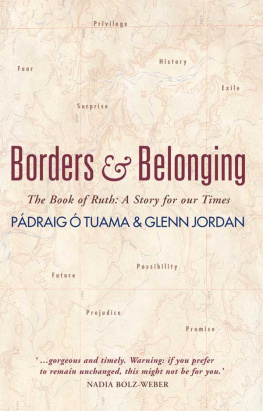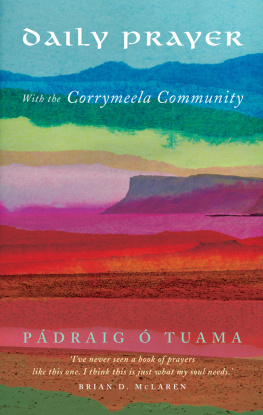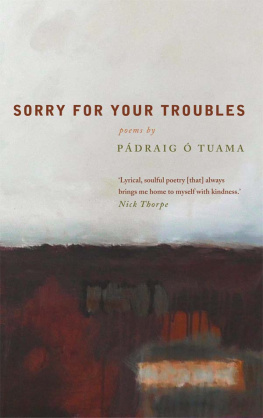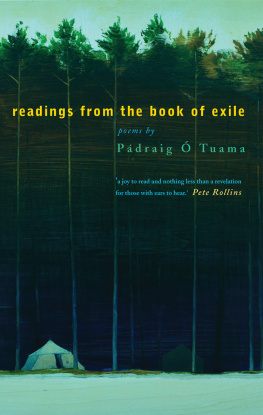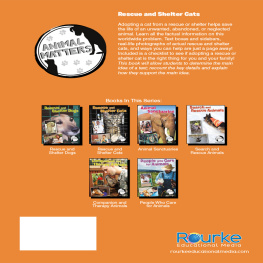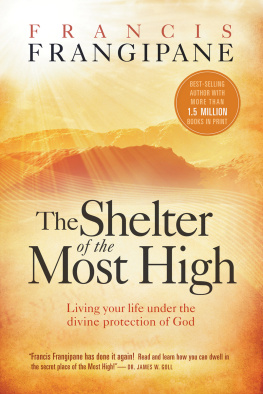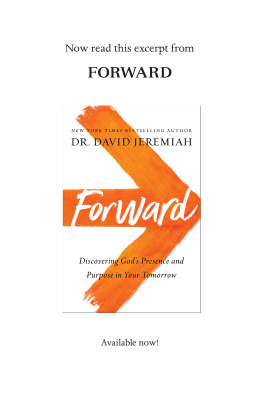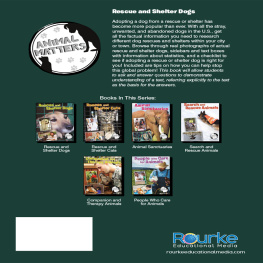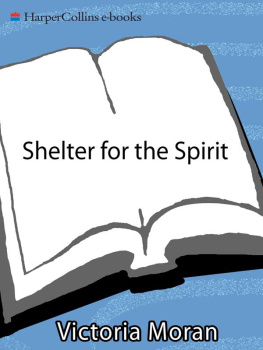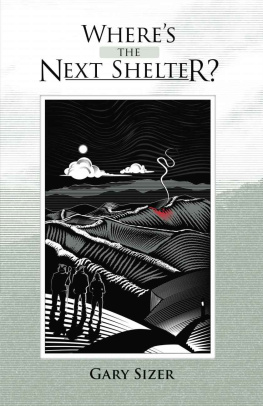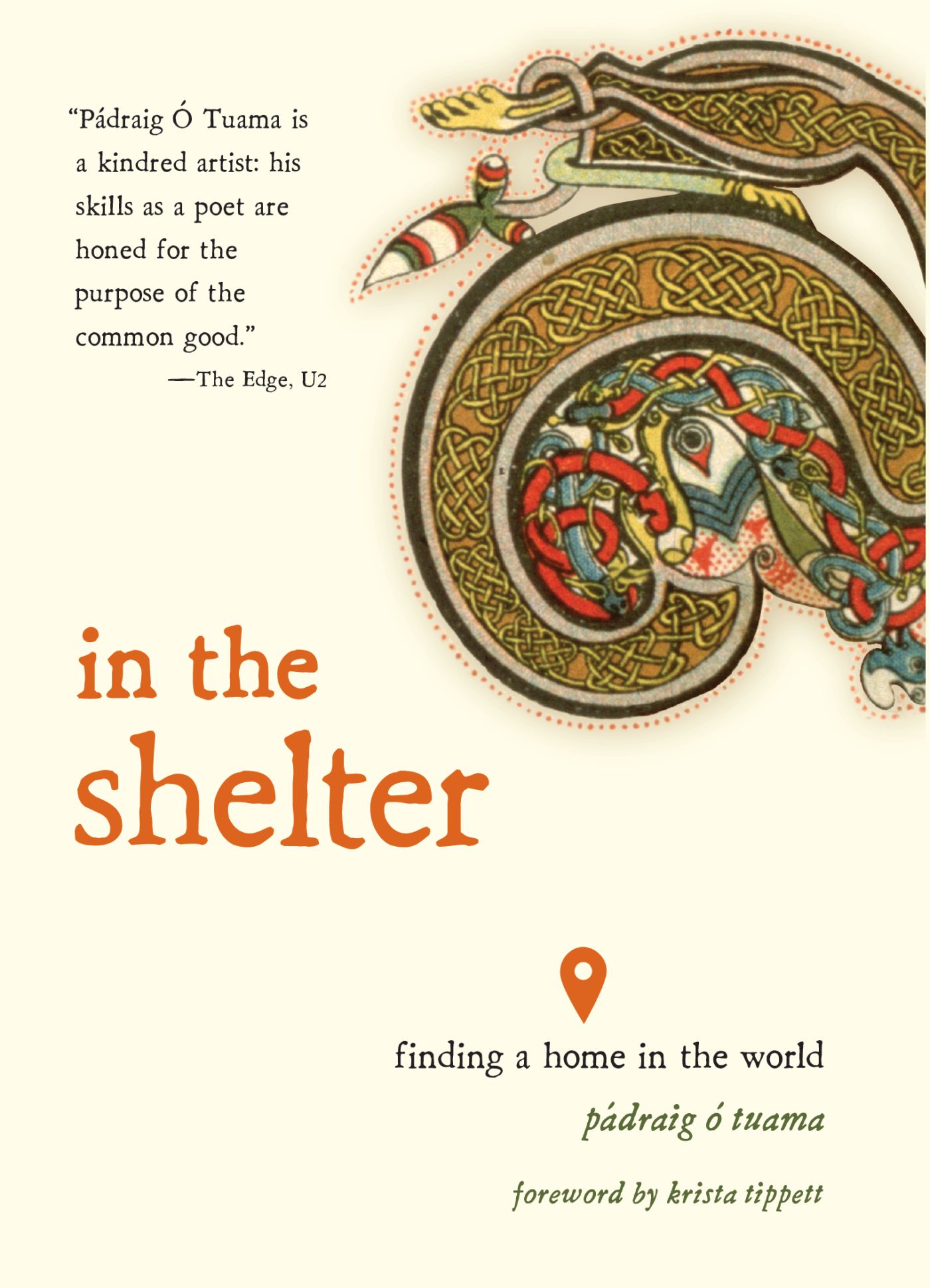
In the Shelter
In the Shelter
finding a home in the world
Pdraig Tuama
foreword by Krista Tippett
Broadleaf Books
Minneapolis
IN THE SHELTER
Finding a Home in the World
Copyright 2015 Pdraig Tuama. Printed by Broadleaf Books, an imprint of 1517 Media. All rights reserved. Except for brief quotations in critical articles or reviews, no part of this book may be reproduced in any manner without prior written permission from the publisher. Email or write to Permissions, Broadleaf Books, PO Box 1209, Minneapolis, MN 55440-1209.
First published in Great Britain in 2015 by Hodder & Stoughton, A Hachette UK company
Unless credited otherwise, poems Pdraig Tuama
The right of Pdraig Tuama to be identified as the Author of the Work has been asserted by him in accordance with the Copyright, Designs and Patents Act 1988.
Unless indicated otherwise, Scripture quotations are from the New Revised Standard Version of the Bible, copyright 1989, 1995 by the Division of Christian Education of the National Council of Churches of Christ in the United States of America and are by permission. All rights reserved.
Every reasonable effort has been made to trace the copyright holders, but if there are any errors or omissions, the publisher would be pleased to insert the appropriate acknowledgment in any subsequent printings or editions.
Cover image: Gus Design/shutterstock
Cover design: Cindy Laun
Print ISBN: 978-1-5064-7052-8
eBook ISBN: 978-1-5064-7053-5
Do Paul, gr mo chro,
agus Ruth Hockey, cara croil.
Contents
Bonn silach scalach.
Travelers have tales to tell.

Where you stumble, there lies your treasure. The very cave you are afraid to enter turns out to be the source of what you are looking for. The damned thing in the cave, that was so dreaded, has become the center.
Joseph Campbell

How we spend our days is, of course, how we spend our lives.
Annie Dillard

Gloria Dei est vivens homo.
Irenaeus of Lyons
This book has been passed hand to hand during tumultuous years in the life of the world. To say that it is one of the most beautiful and quietly necessary books of our young century is a sweeping assertion, but I will make it. This is an exquisite work of spiritual autobiography. It is an original offering of theological and sacred reflection on meanings of belonging, home, and welcome. It is an extraordinary introduction to a biblical way of thinking and questioning, a Christian way of seeing and being. Yet it is presented so winsomely and wisely thatlike every spiritual classicit offers its riches to the secular as to the devout. Pdraig Tuama takes the readers hand and walks us lyrically through his own loss, confusion, despair, joys, and learning. With softness and firmness intertwined, he shows us how to do this with generosity toward ourselves and the others with whom we share life.
The varied fields in which he is an esteemed practitionerreligion, poetry, and conflict mediationmake this a holistic text for navigating the shadows and potentialities that we meet in our life together as in ourselves. But it is the rich, reverent, contagious love of words that binds these various passions and makes this book a delight. The Irish tongue is a character in the book. Pdraig dances with language while he is demanding of it and insists that we should be too. For we so easily bruise others with our words in the course of a day and are bruised. The names we give to things sanctify and reveal their contradictions. It may be more important to get the right people into the room, he observesand what an observationthan to get the right words into the room.
Such insights convince because they have emerged in bitter crucibles of his life. His country was still at war when he was born, and the Irish language that we come to love through reading this book was nearly extinguished. Pdraig endured exorcisms and exile as a young gay man born in a most traditional Catholic culture. He knows the burden of survival but more: I understand that hope can break you. Yet what astonishes, and teaches most profoundly, is the capacity he develops to claim his inheritancehis right to be, his gift to offerin places that have not wanted him. Not to define his country, his neighbors, or his church because of how they have defined and sought to diminish him. He pursues what is life-giving in all of those places and shows us the presence and practice that requires.
The simplest definition of theology is etymological: words about God. Like all the best theology across the ages, Pdraigs words that point at God point back to who we are and can be. And in the best tradition of the biblical and social prophets across time, his disarming use of language cracks open the readers imagination, revealing old formulations that have kept us numb. None of us, if truth be told, knows home, belonging, and welcometangible or spiritualwithout struggle. Indeed, the meaning ofand the means tothese experiences are aching, wide-open questions at the center of twenty-first-century shifts and ruptures. Belonging creates and undoes us both. If spirituality does not speak to this power, then it speaks to little.
I have given this book to young colleagues and to great religious minds, to atheist and Buddhist friends, to my children. Read this, they all affirm with me, and tread more softly, courageously, and self-forgivinglyall at oncethrough our hurting, hoping world and the heartbreaking, heart-opening frontier that is a human life.
Krista Tippett
I didnt grow up in a city, but I was born on the edges of one. My parents moved to the countryside when I was five, so I learned to love fields and long walks. But I always loved the idea of the city.
The word city comes from the Old French cit, which itself comes from the Latin word civis, from which we get the word citizen. The world is in the citizen, whether the citizen is in the city or the forest. But I, taking long walks nightly in the country, longed to be in the city, because there I hoped I could meet the worlds that the country couldnt contain.
Of course, when I moved to the city, I found that the city couldnt contain those worlds either. I met a Finnish woman once who had spent years dreaming of moving to Dublin. When she got there, she was initially distracted, but then, after a while, she said that she realized that she brought her self with herself, and no city was big enough to meet that.
Once, I was in New York City. For ten years Id imagined that I would become a priest there. When I finally managed to visit the city, it took ten minutes to realize that my plans would change. I didnt like the priests, and they wouldnt like me. But I loved the city. I was left with a question: What do I do now?
I walked the city.
I walked until I got lost, and when I was totally lost, I went down into the subway and took a train and felt even more lost. Eventually I found my way to the subway underneath Grand Central Station. I had nowhere to be, and hours to waste, and I couldnt make my mind up about what to doeither with the day or with my life. Both seemed open and both were intimidating. I heard some music from a side of the station and went to look. In the corner was a woman. She was wearing a dress and fancy shoes and a coat and a small hat. Her face was clear and bright, and she was singing along to recorded music. It must have been a well-known church song, because all of the others around her were joining in with the chorus, a chorus that just repeated Alleluia over and over, like a jazzy psalm. She had a lovely voice and moved with style and rhythm, smiling and singing and repeating Alleluia.
Next page
